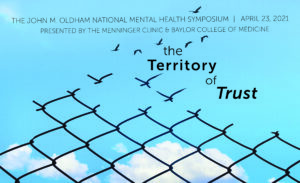The Territory of Trust: Postscript
- May 16, 2021
- Dr. Oldham

BY JOHN M. OLDHAM, MD
Trust is a key weathervane guiding every aspect of our interpersonal world.
Just trust me
Who is trustworthy and who is not? Who is the one I’m not so sure about, and how do I find out? Am I trustworthy? How often do we say, “Look, I’m going to be honest with you”? Does that imply that we’re not always so revealing? Or we hear, “Just trust me, OK?” OK, if we know you to be trustworthy. But what if we don’t?
We posted a blog on trust in January. Now we’re letting you know about a recent event on the topic of trust.
The Territory of Trust virtual webinar
On April 23, 2021, this year’s John M. Oldham National Mental Health Symposium was held, entitled “The Territory of Trust.” I chaired this annual event—generously named after me—for The Menninger Clinic and the Department of Psychiatry and Behavioral Sciences at Baylor College of Medicine.
Prior programs have been held in person in Houston, Texas. This symposium was a virtual Zoom event, and it featured an outstanding roster of leading mental health experts.
The Program
Although it is not possible to make available the actual presentations, listed below are the speakers, a bit about each of them, and links of interest.
Jon G. Allen, PhD: Trusting in Psychotherapy
Dr. Allen is Clinical Professor of Psychiatry in the Department of Psychiatry and Behavioral Sciences at Baylor College of Medicine. He is also a Senior Consultant at the Menninger Clinic. He has written extensively and is a masterful educator and skilled clinician. The focus of his talk was on trusting and trustworthiness in the work of psychotherapy. Using decades of psychotherapy research as a stepping stone, he highlighted the ethical literature pertaining to this topic. He has written a book with the same title as this talk–Trusting in Psychotherapy–which has just been published in 2021.
Kay Redfield Jamison, PhD: Therapeutic Trust, Mania and Moral Ambiguity
Dr. Jamison is Professor of Psychiatry at Johns Hopkins School of Medicine. She is author of An Unquiet Mind, Night Falls Fast, and Touched with Fire, all national bestsellers. Her talk focused on the moral ambiguities often associated with mania, including verbal and physical assaultiveness, illustrated by the life and bipolar illness of the great American poet Robert Lowell. Dr Jamison’s recently highly acclaimed book is Robert Lowell: Setting the River on Fire, A Study of Genius, Mania, and Character.
Lois W. Choi-Kain, MD: Lessons from the Treatment of Borderline Personality Disorder: Using Real Relationships to Improve Real Lives
Dr. Choi-Kain is Director of the Gunderson Personality Disorders Institute at McLean Hospital, and Assistant Professor of Psychiatry at Harvard Medical School. In her talk, she focused on using our professional capacities to develop real relationships. These matter in our efforts to help patients manage their real lives, and to help patients improve their interpersonal, social and occupational skills as they navigate their worlds.
Salman Akhtar, MD: Basic Trust, Earned Trust and Mutual Trust: The Immigrant’s Psychosocial Trajectory
Dr. Akhtar is Professor of Psychiatry at Jefferson Medical College and is a Training and Supervising Psychoanalyst at the Psychoanalytic Center of Philadelphia. He is a prolific author, with over 100 books to his credit. His talk highlighted the importance of “confident expectation” for those newly arriving in our country. That is, they should be able to expect to be treated with respect. For that to happen, he emphasized, we must be trustworthy ourselves. From personal experiences, he described the challenges for immigrants as they adjust to unfamiliar customs and languages in a new land.
Patrice A. Harris, MD: Trust and Systemic Racism
Dr. Harris is the Immediate Past President of the American Medical Association. She is an Adjunct Assistant Professor of Psychiatry and Behavioral Sciences at Emory School of Medicine. An expert in children’s mental health and childhood trauma, Dr. Harris is also Chair of the AMA Opioid Task Force. She is a passionate advocate for equity, inclusion and diversity. Her talk eloquently focused on the embedded nature of systemic racism in our country. She described the challenging program she spearheads in the AMA to proactively sustain an agenda of change.
Helen Riess, MD: Building a Healthcare Culture of Empathy and Trust
Dr. Riess is Director of the Empathy and Relational Science Program at Massachusetts General Hospital. She is Associate Professor of Psychiatry at Harvard Medical School. Dr.Riess is in wide demand as a speaker on empathy and emotional intelligence. For example, her TEDx talk “The Power of Empathy” has been viewed about 700,000 times. In her presentation, she examined the concepts of empathy, compassion and trust through the lens of interpersonal neurobiology. She also reviewed the importance of leadership modeling in order to foster empathy, compassion and trust in healthcare organizations.
Peter Yellowlees, MD: Coping with COVID: Trust and Telepsychiatry
Dr. Yellowlees is Professor of Psychiatry and Chief Wellness Officer at the University of California-Davis Health. His a Past President of the American Telemedicine Association. He has written extensively, centering on the doctor-patient interface. He shows how technologies can be used to promote high-quality patient-centered care and improve physician well-being. In his talk, he reviewed the transformation in healthcare delivery driven by the COVID-19 pandemic. He pointed out advantages and disadvantages of trusting in the process of hybrid care for patients and practitioners.

